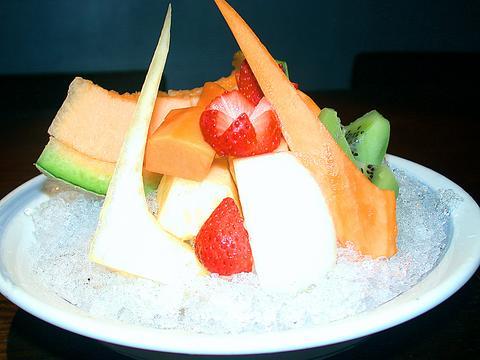One of the better restaurants in town, Shintori (Cuisine Japonaise) has an ornamental bamboo grove outside and oozes class inside, with its attention to design and stripped-down neo-industrial look. The ambience of the place, fortunately, is matched by the service and food.
Comprising a main seating area -- which is set off from the sashimi bar by a large etched plate-glass window -- there is an open kitchen, tunnel-like corridors and faux bridges or water-themed decorative elements. The restaurant also has many private booths that cater to groups of friends, families or a romantic tete-a-tete, that are set up like small sitting rooms, with simple wooden tables, a decorative highlight or freshly cut flowers.

PHOTO: JULES QUARTLY, TAIPEI TIMES
Dinner began with tea and not just any old cha -- a light and fragrant oolong, or clean-tasting green tea -- before moving on to starters that were inventive and genuinely appetizing. "Cubic appetizers" was a nine-box assortment of sushi and sashimi in little black-and-white colored boxes. Rock 'n' roll salad sounded intriguing but I plumped for the rice and salmon flakes in tea soup, which was tasty and powerfully fishy with the addition of small, orange globes of roe.
Main course choices included a sashimi salad with an amazing confection of varied green leaves and hearts of lettuces, along with radishes, baby corns and raw fish, sprinkled with in an elegant dressing. I chose the grilled XXL chicken on a skewer, which arrived with dried chili and cracked pepper, over the promising beef hot pot, grilled black bass filet with buckwheat, and assorted tempura platter. The chicken was good, with extra points for the subtle lemon grass flavoring.
The owners have clearly gone for "zen-style cooking," which they claim has evolved from food served in temples and "the simple diet of Buddhist priests ... into a creative and interesting cuisine." It works, I think, because of good management. There are four Shintori company restaurants in Taipei (which include the People bar and fusion restaurant further down Anhe Road that has become popular with media and business types), with three more in Shanghai. Attention to detail makes the restaurant chain stand out.

Towering high above Taiwan’s capital city at 508 meters, Taipei 101 dominates the skyline. The earthquake-proof skyscraper of steel and glass has captured the imagination of professional rock climber Alex Honnold for more than a decade. Tomorrow morning, he will climb it in his signature free solo style — without ropes or protective equipment. And Netflix will broadcast it — live. The event’s announcement has drawn both excitement and trepidation, as well as some concerns over the ethical implications of attempting such a high-risk endeavor on live broadcast. Many have questioned Honnold’s desire to continues his free-solo climbs now that he’s a

Lines between cop and criminal get murky in Joe Carnahan’s The Rip, a crime thriller set across one foggy Miami night, starring Matt Damon and Ben Affleck. Damon and Affleck, of course, are so closely associated with Boston — most recently they produced the 2024 heist movie The Instigators there — that a detour to South Florida puts them, a little awkwardly, in an entirely different movie landscape. This is Miami Vice territory or Elmore Leonard Land, not Southie or The Town. In The Rip, they play Miami narcotics officers who come upon a cartel stash house that Lt. Dane Dumars (Damon)

Francis William White, an Englishman who late in the 1860s served as Commissioner of the Imperial Customs Service in Tainan, published the tale of a jaunt he took one winter in 1868: A visit to the interior of south Formosa (1870). White’s journey took him into the mountains, where he mused on the difficult terrain and the ease with which his little group could be ambushed in the crags and dense vegetation. At one point he stays at the house of a local near a stream on the border of indigenous territory: “Their matchlocks, which were kept in excellent order,

Today Taiwanese accept as legitimate government control of many aspects of land use. That legitimacy hides in plain sight the way the system of authoritarian land grabs that favored big firms in the developmentalist era has given way to a government land grab system that favors big developers in the modern democratic era. Articles 142 and 143 of the Republic of China (ROC) Constitution form the basis of that control. They incorporate the thinking of Sun Yat-sen (孫逸仙) in considering the problems of land in China. Article 143 states: “All land within the territory of the Republic of China shall